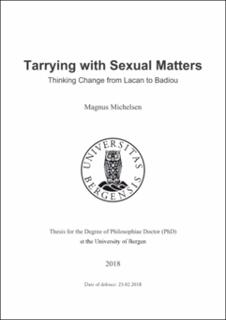| dc.description.abstract | This dissertation interrogates the significance of Alain Badiou's traversal of the antiphilosophy of Jacques Lacan, and the implications of that traversal for Badiou's thinking on the preconditions for the subject and possibilities of radical change. It focuses on the function of sexual matters in Badiou's philosophical works. Its basic presupposition posits that thinking radical change depends on an appreciation of the relations between sexual matters and an ethics of the act of subjective constitution, in the continuation of how psychoanalysis thinks the subject. While the encounter with sexual matters constitutes a key point for the psychoanalytic conception of subjective constitution and the act, sexual matters are less pronounced in the case of Badiou's philosophical works. In order to come to terms with Badiou's traversal of Lacan, this dissertation thus proposes a closer interrogation of the function of sexual matters in Badiou's philosophy. Its main thesis claims that a key to the appreciation of the significance and implications of Badiou's traversal of Lacan is located at the junctions where Badiou's ethical thrust is motivated in seemingly unwarranted conjunction with sexual matters. It argues that a key to Badiou's thinking of radical change is found at the points where his works cannot avoid a certain 'tarrying with sexual matters'. More precisely, the issue is the conceptualizations of truths and subjects as procedures of novelty within a situation that follows from Badiou's mathematical gesture, his elaborations of a materialist dialectic, and how these conceptualizations can be effective for thinking about the possibilities of change. This issue is addressed by way of the analysis of the points at which sexual matters intrude upon Badiou's argumentations. The thesis takes the psychoanalytic reference to sex as real and the definition of the real as the impasse to formalization literally, and states that the intrusions of sexual matters in Badiou's text mark especially dense and significant points in Badiou's confrontation with the Lacanian framework. Reading for the claim that 'sex marks the spot' is first and foremost a methodological thesis, where the analysis of the symptomal knots where sexual matters intrude becomes a method for the elaboration of the consequences of Badiou's philosophical project for thinking the subject of politics and the possibilities for change. The overall question is what it signifies to proceed from the non-object of sexual matters to thinking the possibilities of change by way of a mathematical ontology of multiplicities and a materialist dialectic of universal truths produced in the continuous process of a subject as borne in the division of an evental rupture? This disseration analyzes the mark of sexual matters as it resurges on three occasions in Badiou's work. Firstly, it analyzes the function of sexual matters and the feminine other in relation to Badiou's concept of the generic multiple in L'Être et l'événement, such as it is developed in critical dialogues with Lacan's feminine logic of the non-all. Badiou denotes the generic multiple by way of a reference to the feminine non-all, apparently, but my main claim is that this decision can only make sense if one recognizes the division of the concept of the generic multiple in two: an initial indiscernible of nothing that answers to the nomination of an event, and a consequent generic multiple proper that answers to an actual truth procedure. Secondly, this dissertation analyzes Badiou's conjoining of the real of sex and the real of class in Théorie du sujet, and proceeds to interrogate how Badiou turns to tragedy in order to elaborate on this conjunction. My main claim is that the figure of Prometheus the firebearer communicates Badiou's notion of an ethics of confidence, as the process in which radical change can be carried out. Lastly, this dissertation analyzes the function of the feminine other in relation to Badiou's conceptualization of antiphilosophy in general, in the seminar series on L'Antiphilosophie from 1992-1996. Lacan is there posited as a double exception, as the one to bring contemporary antiphilosophy to its conclusion and as the one to avoid the distinctive criterion of misogyny. My main claim is that these two exceptions have to be read together in order to grasp how Badiou's philosophy proceeds to think radical change from the point of impossibility. In conclusion, I argue that the mark of sexual matters in Badiou's traversal of Lacanian antiphilosophy can be read as nothing less than the mark of Badiou's traversal of Lacan as such. It is not the case merely that Lacanian antiphilosophy deals with sexual matters and that Badiou thus also deals with it, to the extent that he deals with Lacanian antiphilosophy. The moments at which sexual matters intrude upon Badiou's argumentation are also the moments at which the decisive elements of Badiou's arguments meet up and where his elaborations on the subject, its ethical portents, and the possibilities for radical change beyond Lacan reach their climax. It is not simply the case that the Lacanian real of sexual difference necessarily marks the move from psychoanalysis to philosophy. Also Badiou's elaborations on the implications of this move, through the concept of the generic multiple through the ruminations on the status of tragedy to the misogyny of the antiphilosophical act are marked by and carried out in an intricate relation with the issue of sexual matters. | en_US |
